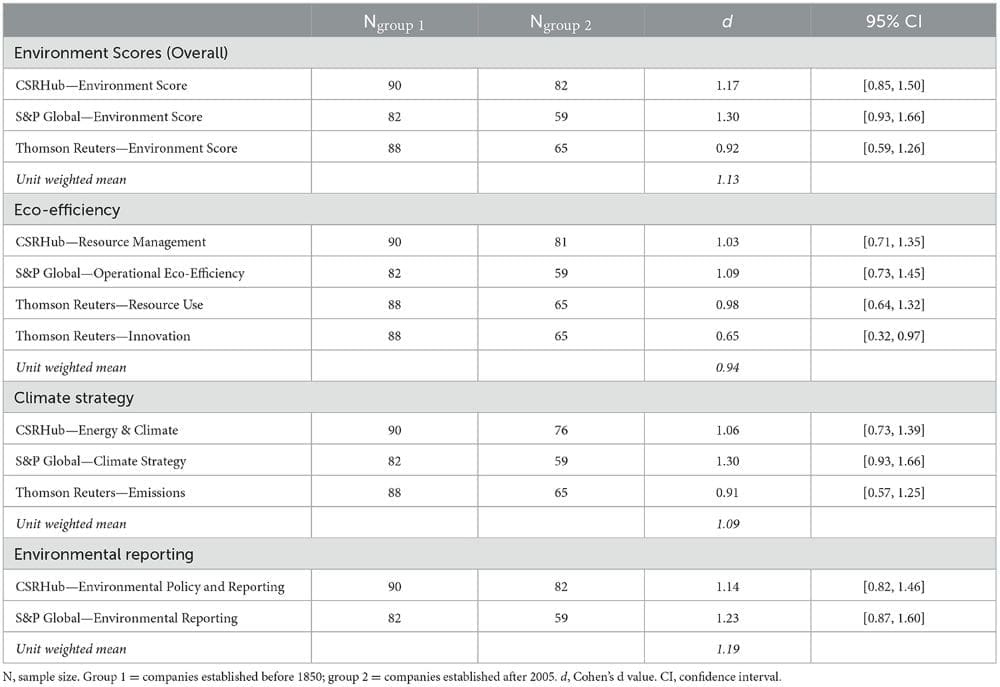Summary:
Environmental sustainability may be more than just a modern imperative — it could be a key to long-term business survival. A new study published in Frontiers in Organizational Psychology suggests that the world’s most environmentally responsible companies are also among its oldest.
Conducted by Daria Haner, Dr. Yilei Wang, Dr. Deniz Ones, Dr. Stephan Dilchert, Dr. Yagizhan Yazar, and Karn Kaura, the research analyzed environmental, social, and governance (ESG) ratings from hundreds of firms across the U.S., Europe, MENA, and Asia. Contrary to the popular belief that younger, more agile startups are best suited to lead on sustainability, the findings reveal that companies established over a century ago consistently outperform newer firms on key environmental metrics.
The study attributes this pattern to more than just financial strength. It argues that longevity itself may cultivate a deeper commitment to sustainability, shaped by decades of institutional adaptation, resource management, and stakeholder engagement. The results challenge assumptions about corporate innovation and environmental leadership, highlighting how long-lived organizations often possess the discipline and systems to implement sustainable strategies effectively. In today’s climate-conscious business environment, the study offers a compelling insight: enduring success and environmental responsibility may be more closely linked than previously thought.

Survival of the greenest: Why world’s oldest organizations are surpassing young upstarts in environmental sustainability
What does it take for a company to last for centuries? Ask most business analysts, and you’ll hear about innovation, financial acumen, or strategic pivots. But new research suggests another key to organizational survival: environmental sustainability. In a study recently published in Frontiers in Organizational Psychology, an international team of researchers reveals a robust link between organizations’ longevity and their commitment to environmentally sustainable business practices. The findings challenge the assumption that younger, more agile companies are best positioned to lead on climate and environmental issues.
The study explores whether firms that have stood the test of time — some over a century old — are also those most committed to preserving the planet. It’s a timely question. As climate change accelerates and the call for corporate accountability grows louder, understanding the organizational characteristics associated with environmental responsibility is more critical than ever.
The study analyzed data from hundreds of firms including industry leaders in tech, manufacturing, and finance in the United States, Europe, the Middle East and North Africa (MENA), and Asia. Our goal was simple yet ambitious: determine whether older organizations exhibit stronger environmental sustainability performance than younger ones. To answer this, our team analyzed environmental, social, and governance (ESG) ratings drawn from multiple independent sources, including CSRHub, S&P Global, and Thomson Reuters, that evaluate companies on dimensions of climate strategy, eco-efficiency, and environmental reporting.
Standing the test of time
The results were striking. In every region examined, older organizations outperformed their younger counterparts on environmental metrics. These effects held even when accounting for company size and wealth, suggesting that longevity itself — not just financial clout — correlates with environmental stewardship. In the United States, for example, companies established more than a century ago showed markedly higher sustainability scores than those formed in the last two decades. The same pattern emerged in MENA and Asian markets. The effect was slightly less pronounced in Europe, likely due to limited availability of incorporation dates of companies in that region, rather than reflecting a substantive difference in sustainability performance.
Beyond establishing this link, our paper takes a deeper dive into why older organizations might be greener, building on evolutionary theories of organizations, resource dependence theory, and psychological frameworks like Cybernetic Trait Complexes Theory. Our central thesis: surviving over time requires adaptation—not just to markets, but to environmental and societal demands. Organizations that endure are those that have learned to navigate resource scarcity, respond to public scrutiny, and build sustainable systems into their operations. In this light, sustainability is not an add-on; it is a survival strategy.
The implications of this work extend beyond theory. One key takeaway is that sustainability is not just the domain of startups or mission-driven newcomers. Older firms, often seen as sluggish or resistant to change, may in fact be the most effective stewards of sustainability, thanks to decades of institutional knowledge, established systems, and embedded norms. These organizations are not only capable of setting long-term goals; they often have the operational discipline and stakeholder networks to see those goals through.
Green shoots of growth
Our findings also carry weight for policy and practice. Policymakers might consider designing incentives that recognize the sustainability strengths of mature organizations, while also supporting younger companies in building long-term environmental strategies. For investors, the message is equally compelling. ESG scores are increasingly used to evaluate corporate risk and resilience. If sustainability performance is a signal of adaptability and thus of long-term viability, then green credentials may offer a glimpse into a company’s staying power.
Still, we must be careful not to paint a one-sided picture. Of course, some legacy firms emerged from eras of industrial pollution and ecological harm. Nonetheless, what matters is not where these companies started but how they have evolved. Our data show that many older firms have adapted meaningfully, outperforming younger peers even in innovation-related sustainability metrics.
Perhaps most powerfully, we believe these data call for a new narrative about sustainability in business. Sustainability is not a generational rivalry. It is not a race between new and old, small and large, or East and West; it is a test of adaptation, a shared evolutionary journey where the most enduring organizations are often those that embrace sustainability as central to who they are. The climate crisis is rewriting what it means to lead in business, and in this new chapter, the champions will be not only the boldest or the strongest, but the greenest.
Journal Reference:
Haner DM, Wang Y, Ones DS, Dilchert S, Yazar Y and Kaura K, ‘Survival of the greenest: environmental sustainability and longevity of organizations’, Frontiers in Organizational Psychology 3: 1521537 (2025). DOI: 10.3389/forgp.2025.1521537
Article Source:
Press Release/Material by Daria Haner, Dr Deniz Ones, and Dr Stephan Dilchert | Frontiers
Featured image credit: rawpixel | Freepik




